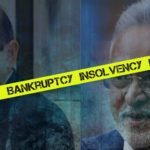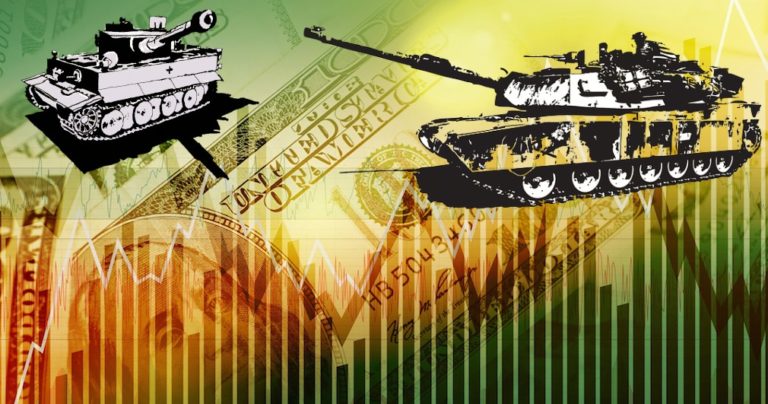How did it start?
The rat race of raising tariffs by the countries across the globe in the recent past has triggered a war of its own kind termed as “Trade War” or the “Tariff Tussle.” The recent imposition of 30% and 20% import tariffs on solar panels & washing machines by the United States on 23rd January followed by duty imposition of 25 % and 10% on steel and aluminum under the guise of national security exception (enshrined under Article XXI of the General Agreement on Tariffs and Trade), and the retaliatory measures taken by the other countries in response have put the global economy on tumultuous path. Ripples of the ongoing Tariff Tussle have reached out far and signal an ominous sign to the global economy where clouds of a unique war coined as “Currency War” is hovering over.
What does it mean?
It is an uphill task for the masses to understand the idea of Currency War. Naturally, it may lead to some very common questions which would pop up in their mind once when they hear about the Currency War more frequently in the news in the coming days. People might wonder what this Currency War is all about? Had it happened in the past? How will it affect them? Etc.
The ongoing Trade War is a result of raising tariffs by the countries intending to protect their domestic industry and restrict imports thereby gaining an undue advantage from ones’ trading partner. Steadfastly escalating tariff tussle is slowly transforming into a new protectionist approach by the countries where they are using a different instrument other than tariff which is currency. Without going much deeper into the economic intricacies, it can simply be understood as an attempt by which a country deliberately devalue or manipulate their currency to boost or incentivize their exports and restrict the imports albeit in a disguised mode. The measure of both kinds certainly goes against the notion of having a free, fair and competitive market.
Currency War is not an entirely new phenomenon it has happened quite a few times in the past more particularly how one can forget the crash of Lehman Brothers and the aftermath of the global financial crisis in 2008 which rattled the global economy including the developed countries like the United States. In the G20 summit which was held post-2008 crisis, it was decided to coordinate efforts and revive the global economy. The potential weapon which the countries used for revival was either devaluing their currency or deliberately keeping the values suppressed so that their exports remain cheaper and competitive in the market. The then Prime Minister of Brazil Guido Mantega described such competitive lowering of currency values using monetary and exchange rate instruments as “international currency wars.”I wish I am proved wrong but if the currency war erupts on a broader scale it will have a far-reaching impact on us, and at this juncture, it is daunting enough even to imagine the aftermaths of destruction it can bring to the global economy.
The Clash of Titans
As if the various wars like World Wars, Cold War, Cyber War & recently Syria War were not enough to adorn the history of wars; Tariff Tussle is getting more intensified with each passing day, and the world is heading towards a Currency War. Imposition of tariffs on Solar Panel and Washing Machines by the United States although not explicitly targeting China but the fact remains that China is the world leader in manufacturing solar panels and the largest exporter of washing machines. This in result provoked China to hit back with retaliatory tariff measures with Russia also joining hands with China. The bandwagon effect let other countries to jump into this tariff tussle for their vested interests. Mr. Trump recently blamed China for manipulating its currency and making U.S exports less competitive. Two most powerful economies of this globe, i.e., United States & China have been locking horns though not with any commonly used war weapons. But, with a weapon which is more lethal and fatal to the human race than those weapons of mass destruction, a weapon with having an infinite potential to reduce the global economy to the ashes. I strongly disagree with U.S President Trump over his below statement:
Trade wars are good and easy to win.
History bears the testimony that wars of any kind have resulted in nothing but rattled the economies, ruined the civilization, brought misery to the masses and reduced territories into the debris.
India in the middle: Concerns & the Option
In the last decade, India has taken a giant leap forward and have jumped from 13th largest economy in 2008 to 6th largest economy in 2018. This can mainly be attributed to robust global trade and an upswing economy which has been a significant booster to India’s growth. Amidst the clash of Titans, India finds itself in the middle of the Sea. Naturally, then the question arises can India remain untouched by the seismic shifts in the global economy? The answer is of course not, being one of the strongest emerging economies it cannot afford to stay away from the current conundrum. Flames of the fire are bound to make India feel the heat of the situation. India has already faced the wrath of steel and aluminum tariffs. An escalated tariff tension can hurt the global economy which in turn can retard India’s growth prospects. It is undoubtedly a cause of concern for India if the magnitude of currency war keeps increasing. It may restrict RBI’s flexibility in the use of instruments for addressing problems of inflation, slowing growth and weakening rupee. I agree entirely with what Mr. Raghuram Rajan have rightly mentioned that India should not focus on the devaluation of the currency rather it should increase its productivity to remain competitive in the global market. India has no other option than to sail through the rough seas of this economic turmoil. Before it becomes too late we must take proper steps at the earliest otherwise there will be nothing left either to lament.
Where can it take us?
The real Tariff tussle at best can offer to the countries a sorry spectacle of momentary growth at the cost of their trading partners. At worst they will result in consecutive bouts of inflation, recession, retaliation and often sometimes into the actual violence. If it continues to remain unabated, we should be ready to face the crisis worse than 2008. There is a dire need of combined and concerted efforts from the countries across the globe to strategically resolve it before the issue becomes worst and avoid getting into the situation that might leave the humankind with no other option than to bite the bullet.
Further; Read More:
Insolvency and Bankruptcy Code: Tale Of A Missed Opportunity



